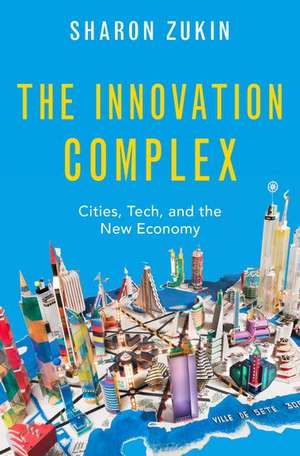The Innovation Complex: Cities, Tech, and the New Economy
Autor Sharon Zukinen Limba Engleză Hardback – 2 apr 2020
Toate formatele și edițiile
| Toate formatele și edițiile | Preț | Express |
|---|---|---|
| Paperback (1) | 146.72 lei 10-16 zile | |
| Oxford University Press – 29 apr 2022 | 146.72 lei 10-16 zile | |
| Hardback (1) | 183.98 lei 10-16 zile | +49.40 lei 4-10 zile |
| Oxford University Press – 2 apr 2020 | 183.98 lei 10-16 zile | +49.40 lei 4-10 zile |
Preț: 183.98 lei
Preț vechi: 209.86 lei
-12% Nou
Puncte Express: 276
Preț estimativ în valută:
35.20€ • 36.85$ • 29.13£
35.20€ • 36.85$ • 29.13£
Carte disponibilă
Livrare economică 06-12 martie
Livrare express 28 februarie-06 martie pentru 59.39 lei
Preluare comenzi: 021 569.72.76
Specificații
ISBN-13: 9780190083830
ISBN-10: 0190083832
Pagini: 320
Dimensiuni: 234 x 163 x 31 mm
Greutate: 0.61 kg
Editura: Oxford University Press
Colecția OUP USA
Locul publicării:New York, United States
ISBN-10: 0190083832
Pagini: 320
Dimensiuni: 234 x 163 x 31 mm
Greutate: 0.61 kg
Editura: Oxford University Press
Colecția OUP USA
Locul publicării:New York, United States
Recenzii
Zukin's work mainly provides a fascinating insight into a city in transition... Zukin's book can convince us to make cities sustainable, not only physically but also in a social sense.
There are many ways agglomeration serves to create value through innovation. However, Zukin goes beyond the typically described positive effects, in particular efficient knowledge diffusion, to recognize the negative social and economic effects.
I found the book particularly interesting for those scholars dealing with innovation and entrepreneurship in a rather quantitative manner, since it may help them to better comprehend the interesting stories behind innovative entrepreneurship, which too often risk being hidden by the 'cold' numbers of econometrics.
Sharon Zukin's Innovation Complex proves once again that she is one of the most astuteobservers of American cities. For decades, innovation and the tech industry were thought to be the province of the suburbs. But Zukin shows how and why innovation and startup companies have come back to the city en masse and the economic contradictions that the rise of the urban innovation complex brings.
With a keen eye and a sly sense of irony, Sharon Zukin takes us behind the doors of the startups, venture capital firms, business incubators, co-working spaces, and coding camps that have made New Yorka major hub of what she aptly dubs 'The Innovation Complex.' Beneath the technical wizardry and relentless boosterism of this new world, Zukin sees reasons to be skeptical about its promises to deliver a better life for us all.
In The Innovation Complex, Sharon Zukin masterfully reveals how New York City-of all places-pivoted to tech and established an ecosystem rivaling Silicon Valley.In the process, she helps us understand cities, the startup world, and the economic tensions that come with progress.
Sharon Zukin deftly argues in The Innovation Complex that tech capitals do not simply bubble up from a primordial soup of young entrepreneurs' inventions. They are made through ideas, norms, and narratives as well as by policies and investments. Zukin takes us on a tour of the specific places and activities that make up the New York City innovation complex-hackathons, meetups, innovation districts, tech campuses, boot camps, and co-working spaces. What we come to see is the political process of innovation itself and how this process reconfigures cities. The result is a nuanced and critical look at the costs that a tech boom exacts on cities and citizens.
There are many ways agglomeration serves to create value through innovation. However, Zukin goes beyond the typically described positive effects, in particular efficient knowledge diffusion, to recognize the negative social and economic effects.
I found the book particularly interesting for those scholars dealing with innovation and entrepreneurship in a rather quantitative manner, since it may help them to better comprehend the interesting stories behind innovative entrepreneurship, which too often risk being hidden by the 'cold' numbers of econometrics.
Sharon Zukin's Innovation Complex proves once again that she is one of the most astuteobservers of American cities. For decades, innovation and the tech industry were thought to be the province of the suburbs. But Zukin shows how and why innovation and startup companies have come back to the city en masse and the economic contradictions that the rise of the urban innovation complex brings.
With a keen eye and a sly sense of irony, Sharon Zukin takes us behind the doors of the startups, venture capital firms, business incubators, co-working spaces, and coding camps that have made New Yorka major hub of what she aptly dubs 'The Innovation Complex.' Beneath the technical wizardry and relentless boosterism of this new world, Zukin sees reasons to be skeptical about its promises to deliver a better life for us all.
In The Innovation Complex, Sharon Zukin masterfully reveals how New York City-of all places-pivoted to tech and established an ecosystem rivaling Silicon Valley.In the process, she helps us understand cities, the startup world, and the economic tensions that come with progress.
Sharon Zukin deftly argues in The Innovation Complex that tech capitals do not simply bubble up from a primordial soup of young entrepreneurs' inventions. They are made through ideas, norms, and narratives as well as by policies and investments. Zukin takes us on a tour of the specific places and activities that make up the New York City innovation complex-hackathons, meetups, innovation districts, tech campuses, boot camps, and co-working spaces. What we come to see is the political process of innovation itself and how this process reconfigures cities. The result is a nuanced and critical look at the costs that a tech boom exacts on cities and citizens.
Notă biografică
Sharon Zukin is a Professor of Sociology at Brooklyn College and the City University of New York Graduate Center. Her books, including Loft Living, The Cultures of Cities, and Naked City (Oxford), profile change in New York from the 1970s to the 2020s.
